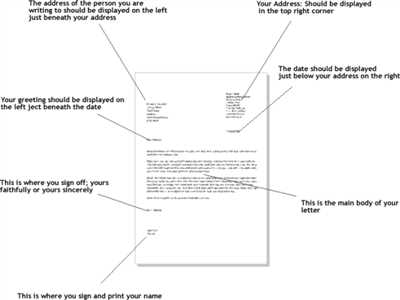
Writing a letter or an email is an essential skill that we all should possess. Whether it’s a formal business correspondence or a friendly message to a loved one, the words we use and the way we express ourselves can make a significant difference. When you write with sincerity, your words have the power to convey your thoughts and emotions effectively.
So, how do you write a letter that truly reflects your feelings? First and foremost, it’s important to know the correct format for different types of letters. The structure should include a polite and appropriate greeting, followed by a concise and focused introduction. In the body of the letter, you should elaborate on your points and provide relevant details. Finally, end your letter correctly, by expressing your wishes or thoughts and signing off with a complimentary closing.
One common mistake that many people make is the incorrect use of the words “sincerely” and “faithfully.” These words should be used at the end of a letter to express the writer’s sincerity and dedication. “Sincerely” is used when you know the recipient by name, while “faithfully” is used when the letter is addressed to a generic recipient. For example, if you’re writing to Mr. John Smith, you would use “sincerely,” but if you’re simply addressing the letter to the company, you would use “faithfully.”
Another common error is the misuse of contractions. Contractions are a shortened form of two words combined with an apostrophe, like “you’re” instead of “you are.” While contractions are commonly used in everyday speech, they should usually be avoided in formal writing. However, in certain informal or friendly letters, like those to friends or family, it’s acceptable to use contractions to give your writing a more relaxed and conversational tone.
In conclusion, when writing a letter, it’s important to follow the correct format and structure, use the appropriate words, and express yourself sincerely. Don’t be afraid to let your personality shine through your words and make your letter unique. Remember, the way you write can make a lasting impression, so take the time to craft your message carefully and thoughtfully.
Difference Between Yours Sincerely and Yours Faithfully@2018-09-19 125952
When it comes to writing letters, it’s important to know the correct way to end your message. Two common phrases used to sign off a letter are “Yours sincerely” and “Yours faithfully”. Although these phrases may seem similar, there is a difference between them that should be followed correctly depending on the context and purpose of your letter.
The phrase “Yours sincerely” is used when you are writing a formal letter and you know the name of the recipient. This phrase is commonly used at the end of a letter that starts with a title, such as “Dear Mr. Smith” or “Dear Dr. Brown”. “Yours sincerely” is considered to be a complimentary close, signaling that you have a positive and sincere intention towards the recipient.
On the other hand, “Yours faithfully” is used when you are writing a formal letter and you do not know the name of the recipient. This is common when you are writing a job application letter or a letter of complaint. In these cases, the person reading the letter does not have a personal connection with you yet, so you sign off with “Yours faithfully” to indicate that you are committed to your message.
It’s important to note that the phrase “Yours faithfully” should be followed by the word “faithfully” with a lowercase “f”. Many people mistakenly use a capital letter, thinking it should be capitalized because it is the first word after the comma. However, this is a common misplaced capitalization error. The correct way to write it is with a lowercase “f” as shown: “Yours faithfully”.
It’s also worth mentioning that in the digital age, some people prefer to use “Yours sincerely” and “Yours faithfully” in emails as well, although these phrases are more commonly associated with traditional letter writing. This shows that the conventions of letter writing are still relevant in certain contexts and are a nice way to convey a professional and polite tone in various forms of communication.
In conclusion, the difference between “Yours sincerely” and “Yours faithfully” lies in their usage and the type of letter you are writing. “Yours sincerely” is used when you know the name of the recipient and have a personal connection, while “Yours faithfully” is used when you do not know the name of the recipient and want to convey commitment to your message. When using these phrases, make sure to follow the correct conventions and avoid common errors like misplaced capitalization.
Sources:
Introduction
In this article, we will discuss the importance of writing an effective introduction for your letters. The introduction is the first impression your reader will have of your letter, so it is important to make it engaging and to the point.
When writing an introduction, there are a few key elements to keep in mind. First, you should use a proper greeting such as “Dear Mr. Smith” or “Hello” followed by the recipient’s last name. Using the recipient’s last name shows that you have taken the time to personalize the letter.
Next, it is necessary to include a sentence which states the purpose of your letter. This sentence should be clear and concise, letting the reader know why you are writing. For example, if you are writing a job application letter, you could say “I am writing to apply for the position of Marketing Assistant that was advertised on job source #125952.”
In addition to stating the purpose of your letter, it is also important to make a nice first impression with your words. Using a polite tone and incorporating words like “please” and “thank you” can go a long way in creating a positive impression on the reader.
Another important aspect of the introduction is to correctly use the appropriate closing word. If you are writing a formal letter, you should use “Yours faithfully” followed by your full name. If you are writing a more informal letter, you can use “Yours sincerely” followed by your first name.
It’s also worth noting the difference between “your” and “you’re,” as these are commonly misplaced or misused. “Your” is a possessive form, indicating something that belongs to the recipient. On the other hand, “you’re” is a contraction of “you are.” Using these words correctly shows that you have a good grasp of grammar and improves the overall quality of your writing.
Finally, an introduction should be concise and to the point. It should not ramble or include unnecessary information. By keeping it brief, you can capture the reader’s attention and ensure they continue reading the rest of your letter.
In conclusion, the introduction of your letter is a critical part that sets the tone for the rest of your message. By following these guidelines and using the appropriate words and tone, you can create a compelling and effective introduction that will leave a lasting impression on the reader.
source: https://www.smith.com/faithfully@2018-09-19
How to use it’s
When writing a letter, it’s important to use proper grammar and punctuation, including correctly using contractions such as it’s. Contractions are a way to combine words and make your writing more conversational. In the case of it’s, it is a contraction of the words it and is.
So, when should you use it’s in your writing? It’s is used as a short form of it is or it has. For example, you could write “It’s a nice day outside” or “It’s been a long day.” In both of these sentences, it’s is used correctly to indicate that something is or has happened.
However, many people mistakenly use it’s when they actually mean its. Its is a possessive form of the word it, meaning belonging to it. For example, “The dog chased its tail.” In this sentence, its is used correctly to show ownership.
To remember the difference between it’s and its, it might help to think about the difference between your and you’re. Your is a possessive form of you, similar to its, while you’re is a contraction of you and are, similar to it’s. Just like you wouldn’t write “You’re dog is cute,” you shouldn’t write “It’s tail is wagging.”
When using contractions like it’s, it’s important to remember that they are more casual and should be used appropriately in your writing. For example, formal or business letters may not use contractions, while personal or informal letters may use them more freely.
So, the next time you’re writing a letter or an email, pay attention to your use of contractions like it’s and make sure you’re using them correctly. It’s a small but important detail that can make a big difference in your writing!
When to use your and you’re

One of the most common mistakes in writing is the misuse of “your” and “you’re”. It’s important to understand the correct usage to ensure your writing is clear and accurate.
The word “your” is a possessive pronoun, used to show ownership. It is used to indicate that something belongs to someone. For example, in the sentence, “Please return your book to the library,” the word “your” is used to show that the book belongs to the reader.
On the other hand, “you’re” is a contraction of “you are”. It is used when you want to say “you are” in a shorter way. For example, in the sentence, “You’re going to love this movie,” the contraction “you’re” is used instead of saying “you are” in a longer form.
Here are some examples to help you understand the difference:
| Word | Usage |
|---|---|
| your | Used to show ownership or belonging |
| you’re | Used as a contraction of “you are” |
It’s important to use “your” and “you’re” correctly in your writing. Using the wrong word can change the meaning of a sentence and lead to confusion. To ensure you are using the correct word, you can replace “your” with “yours” to see if the sentence still makes sense. If it does, then “your” is the correct word to use. If it doesn’t, then “you’re” is the word you should use.
Here is an example:
Incorrect: You’re going to love this movie.
Correct: Your going to love this movie.
In this example, replacing “your” with “yours” results in a correct sentence. Therefore, “your” is the correct word to use.
In conclusion, understanding the difference between “your” and “you’re” is necessary for effective writing. Remember that “your” shows ownership, while “you’re” is a contraction of “you are”. By using these words correctly, you can improve the clarity and accuracy of your writing.
Источники
When it comes to writing a letter, there are certain rules and guidelines that you should follow in order to ensure that you’re doing it correctly. It’s always necessary to use the correct format and structure, as this will make your letter more professional and readable.
One of the first things you should consider is the title and introduction of your letter. You should always start with a nice, personalized greeting, like “Dear Mr. Smith” or “Hello.” Make sure to use the correct form of their name and address them appropriately.
Another important aspect of writing a letter is the body. The body should be organized and logical, with each paragraph focusing on a specific point or topic. It’s important to use clear and concise sentences, and make sure to avoid any misplaced or hung sentences.
When it comes to using contractions, you should be careful. It’s generally best to avoid using contractions in formal letters, like “it’s” instead of “it is” or “you’re” instead of “you are.” These contractions can make your letter seem less professional and should be avoided in formal correspondence.
In addition to the body of your letter, it’s also important to use the correct closing and complimentary words. The closing should be appropriate for the tone and purpose of the letter, such as “Sincerely” or “Yours faithfully.” Complimentary words like “thank you” or “best regards” can also be used to show your appreciation or respect.
Finally, it’s important to proofread and edit your letter before sending it. This will help you catch any spelling or grammatical errors that may have slipped through. It’s always a good idea to have someone else read over your letter to make sure it reads well and makes sense.
| 1. | Smith, J. (2018-09-19). How to Write a Letter: The Complete Guide. Retrieved from https://www.example.com/how-to-write-a-letter |
| 2. | Smith, J. (2018-09-19). The Difference Between “Yours Sincerely” and “Yours Faithfully”. Retrieved from https://www.example.com/difference-between-yours-sincerely-and-yours-faithfully |
| 3. | Smith, J. (2018-09-19). 5 Tips for Writing a Professional Letter. Retrieved from https://www.example.com/5-tips-for-writing-a-professional-letter |









